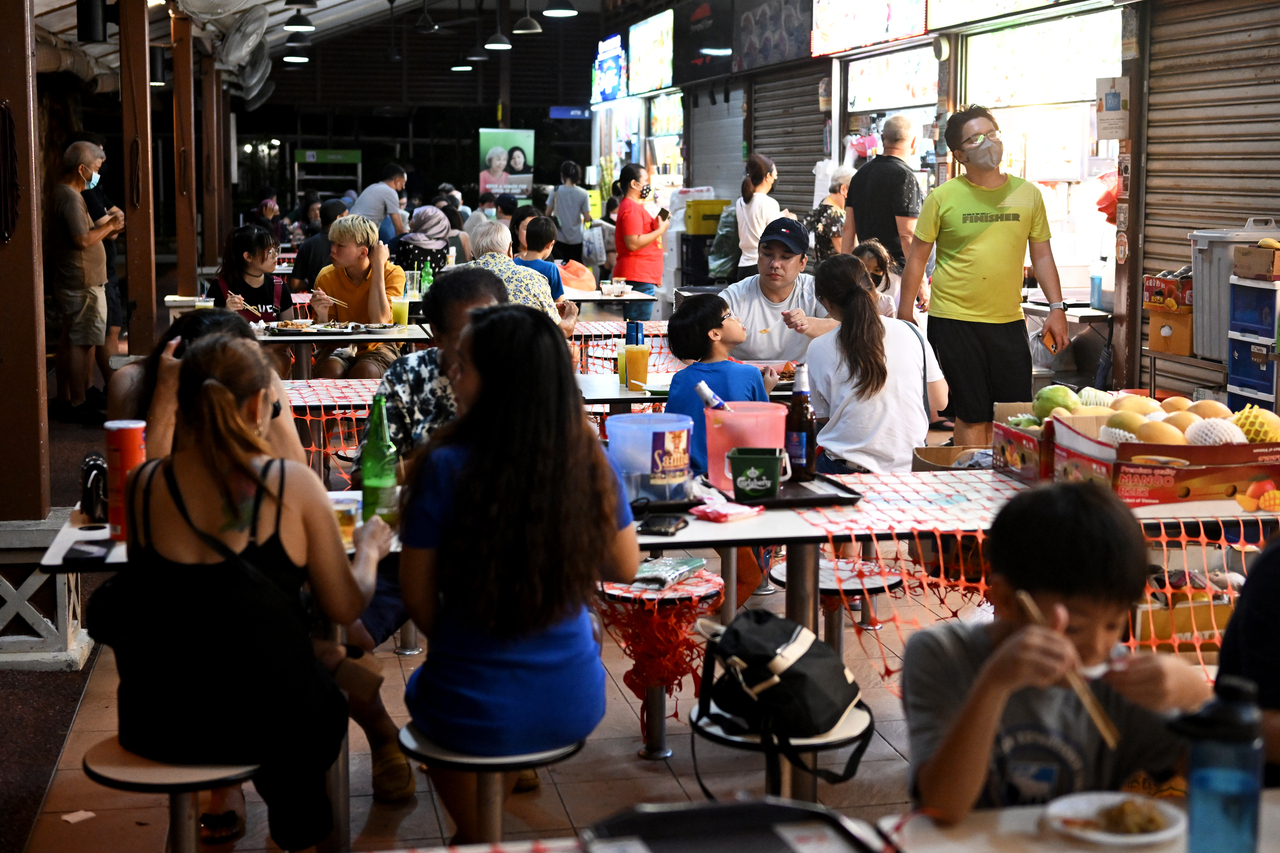S'pore in good place in Covid-19 fight with no spike in numbers despite easing of curbs: Experts
Sign up now: Get ST's newsletters delivered to your inbox

Singapore will still need bit more time before Covid-19 can truly be endemic.
ST PHOTO: LIM YAOHUI
SINGAPORE - Singapore is in a good place in its battle against Covid-19, experts say.
The number of patients hospitalised with Covid-19 has fallen steadily over the past month, from about 700 a month ago to 223 as at Wednesday (April 20).
Numbers for intensive care hospitalisation have also seen a similar downward trend, from about 25 patients a month ago to just eight as at Wednesday.
This comes despite the relaxation of measures, such as the easing off on mandatory mask wearing outdoors from March 29, larger group sizes, and allowing the sale and consumption of alcohol after 10.30pm.
All nightlife businesses have also fully reopened from Tuesday (April 19), with safety measures in place.
Professor Dale Fisher, a senior infectious diseases consultant at the National University Hospital, cited the following reasons: First, many people have been recently infected and have attained natural immunity.
This sits on top of Singapore's high vaccination rates, where 92 per cent of the total population have completed their full vaccination regimen and 73 per cent of the total population have taken their booster shots.
"With 800,000 documented cases in the last three months, and the real number is likely to be higher, most people are very well protected. Many people have been boosted naturally recently.
"Furthermore, mask wearing indoors is still mandated and gatherings remain restricted. These have been shown to be very effective interventions at preventing spread," Prof Fisher said.
Singapore's Covid-19 numbers are also similar to what is being seen in other countries, with the notable exception of China, suggesting that the Sars-CoV-2 is behaving like other pandemic viruses in history, said Professor Paul Tambyah, president of the Asia-Pacific Society of Clinical Microbiology and Infection.
"This means that over time, viruses become more transmissible and less virulent - this happened with the deadly Spanish flu of 1918 and the H1N1 2009 influenza."
Noting that Singapore is in a very good position to further ease measures, Associate Professor Alex Cook, vice-dean of research at the Saw Swee Hock School of Public Health at the National University of Singapore, said: "Given that the last relaxation of measures did not lead to a resurgence in the epidemic, I think we can push on with further liberalisation."
Some examples include the current 75 per cent cap on the number of people at workplaces, which is not much different from 100 per cent on site, from an epidemiological perspective, Prof Cook said.
"I would also consider removing caps on social gatherings and the number of visitors to homes, especially when enforcement is spotty.
"I've argued before that children should be prioritised for a return of normal life, given their low risk to severe Covid-19, and now seems like a good a time to do so.
"We've already had masks become optional for language classes, so making it optional for other classes too should be considered."
Prof Cook, who just returned from a trip to London, added: "I had my first experience of pre-departure testing, which seemed disproportionately inconvenient, compared to the risk the traveller posed to society if he or she was indeed infected.
"With herd immunity, we won't have waves being sparked off by infected travellers, unless they return with a new variant, but the way to address that is to limit testing to countries with new variants."
Though Singapore's daily case count has been falling, experts also noted that these numbers are inaccurate.
The number of cases itself does not matter very much as many people with mild symptoms just sit it out at home without getting tested by a doctor, Prof Cook said.
Instead, people should focus on more reliable trends, such as cases admitted to hospital, Prof Fisher said.
It is very important to maintain surveillance for new viruses and also for potential threats to the already strained healthcare system, Prof Tambyah said.
"Surveillance is done for influenza, upper respiratory tract infections, measles, mumps and a host of other diseases of public health significance, and these are publicly reported on a weekly basis on the Ministry of Health's website," Prof Tambyah added.
However, Singapore will still need a bit more time before Covid-19 can truly be endemic.
Prof Cook said: "Although the numbers have been quite similar this week compared to last week, I suspect this is not an indication that we've reached a steady state, but could be the result of two opposing forces: the natural drift down due to higher immunity and a higher transmission rate due to bigger group sizes and some people not wearing masks outdoors."
He added: "We're not quite in the endemic state, because we still impose measures, such as indoor mask wearing and civil restrictions on group sizes, that I don't imagine will be in the long-term game plan except in emergencies such as when novel variants emerge."
A bit more time will be needed before Singapore can declare Covid-19 endemic, Prof Fisher said.
"But we are certainly closer to the stable case numbers and predictable waves that one would see in endemicity."



